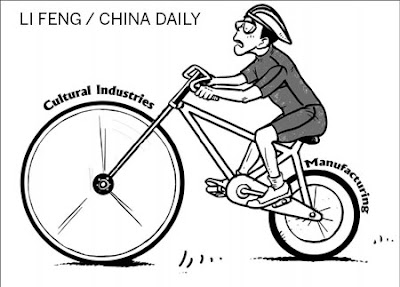I recently came across an article entitled Key to Unlocking China's Creativity by Andrew White, a professor at the University of Nottingham in Ningbo, China. The article discusses a book by Chinese author Li Wuwei, How Creativity is Changing China, which was written in Chinese, but has been translated into English. Li argues that if China's economy is going to continue its rapid development, it will have to become more creative and less reliant on manufacturing. This is probably true - although manufacturing will remain a very important contributor to the Chinese economy, there are already significant changes in China that are posing challenges to China's role as the low-cost manufacturing capital of the world.
 |
| Will Chinese cultural industries overtake manufacturing in the future? |
While China has been popular with foreign companies over the past few decades for its huge, cheap workforce, as China's economy has grown and inflation has increased, Chinese workers are increasingly demanding higher pay. Combined with the problem (mentioned by the article) that Chinese manufacturers usually keep a small portion of the profits from goods they make for Western companies, some Chinese factories are and increasingly will struggle to stay in business, especially with lower-labor cost competitors such as Vietnam.
According to Li, the cultural industries, which grew significantly in China from 2006 to 2009, provide serious growth opportunities. However, one impediment to such growth may be the lack of creativity in China. Li suggests that China's education system needs to change in order to develop more creative individuals. As a teacher in China, I certainly agree. From what I've observed, Chinese education still relies almost solely on memorization and recitation of information. While this can be very important and useful in some respects, I find that students often don't really understand the information they've memorized (and may be able to recite well).
I don't think Chinese people are inherently less creative than any other people. In fact, China is responsible for some of the world's great inventions (the compass, gunpowder, printing, etc.). However, these inventions all go back quite a way historically. In more modern times, China does seem to have lagged in comparison to the Western world. I'm not sure exactly why or what changed although I suspect that the past few centuries of war and natural disasters may have played some role. Chinese education has also probably played a significant role. Chinese students don't seem to have any experience with analyzing things or thinking critically. As far as I can tell, they just aren't generally encouraged to do so. China is still very much a society where most people follow what they're told to do (by the government, their parents, their teachers, etc.) without ever thinking about or questioning why they do things or whether there might be a better way. I think this is partly due to the government's emphasis on promoting a harmonious society, a catchphrase often used by President Hu Jintao to describe an increasingly middle class society with (ideally) no social or political disturbances.
A fellow foreign teacher told me recently that he asked students in his class to think about and describe an invention they would like to make (they didn't actually have to invent it, just come up with an original idea). The teacher was initially impressed with one student who described a time door which allows you to go back or forward in time. The teacher was a bit skeptical and, after discussing it with someone else, found out that the student's time door was the "Anywhere Door", from the Japanese anime series Doraemon. Instead of trying to think of some new invention, the student simply copies one someone else had already thought of.
Copying is a huge part of Chinese culture, dating back at least to the time of Confucius (551 - 479 BC) and continuing to the present (just look at all the counterfeit products prevalent throughout China). This is true not only in terms of copying popular products, but also cultural expression such as music and film. Modern Chinese culture is largely based on copying cultural elements of foreign cultures, especially Japanese and Korean. This is a bit ironic, considering that for centuries, China was the cultural center of Asian civilization and many important aspects of Chinese culture were copied by other countries, especially Japan and Korea.
There are of course exceptions - some Chinese people still manage to be highly creative despite living in a culture that discourages such behavior. Its also possible that things may change - as China continues to evolve economically, it may also develop in other ways that stimulate creativity. At this point though, the Chinese education system seems to be more of a limiting factor than a stimulating one in producing a creatively harmonious society in China.


